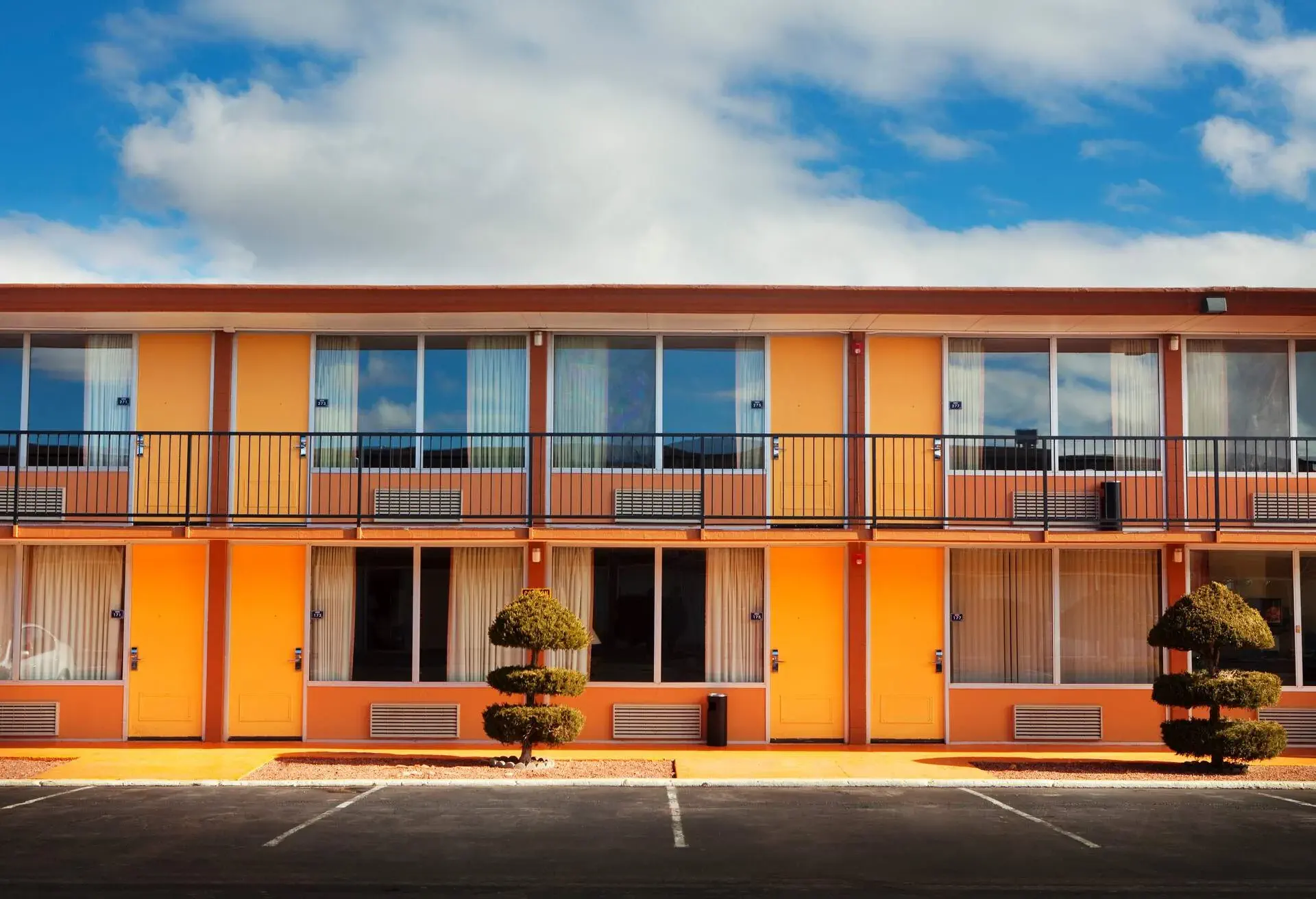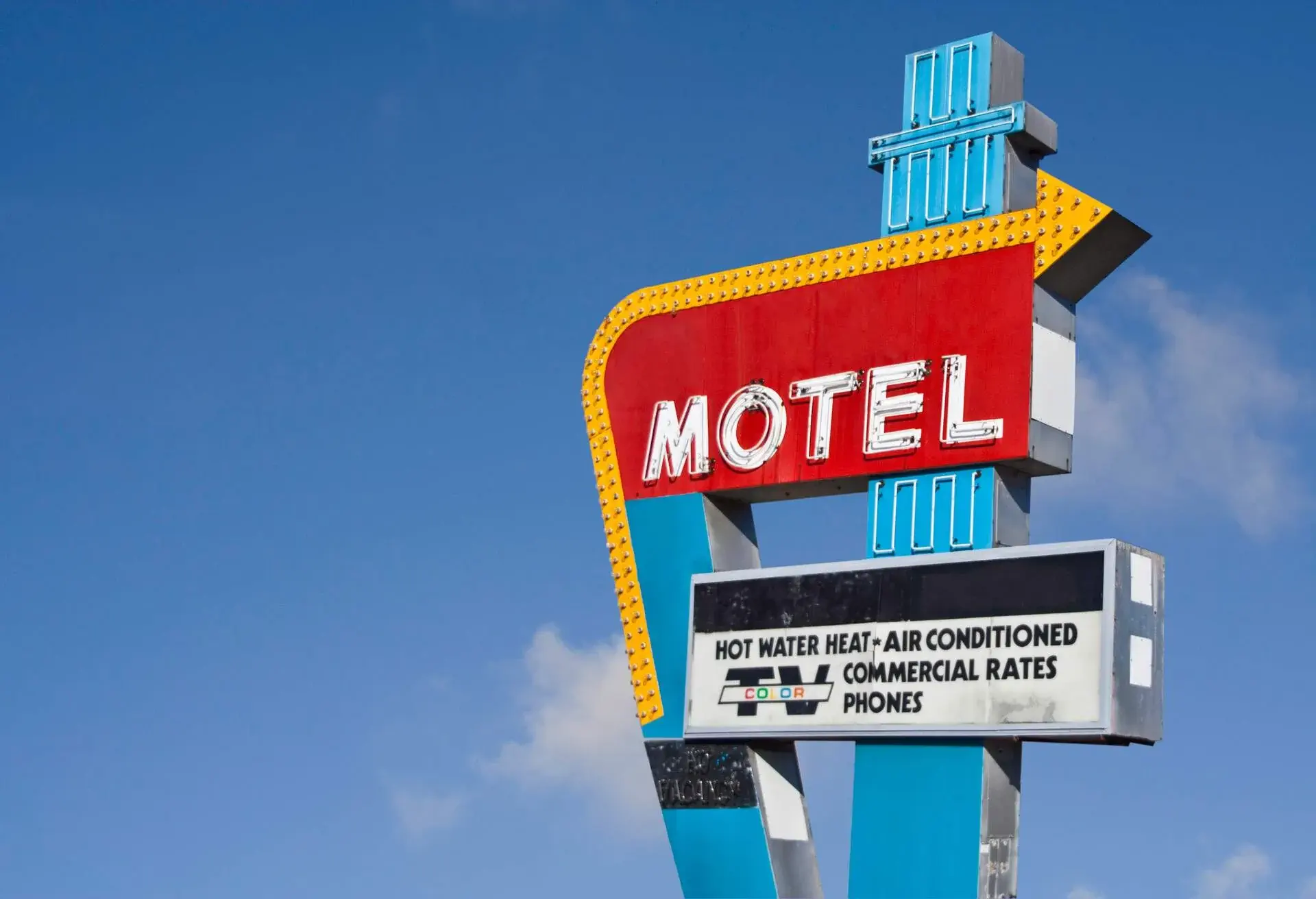Knowing the key difference between a hotel and motel is crucial when you’re deciding where to stay during your travels, as is considering the type of trip you’re taking. Keep reading for everything you need to know about motels and hotels.
Motel vs hotel quick overview
| Motels | Hotels |
|---|---|
| Located close to roads and highways | Located in cities or towns or near major attractions, airports, and other sites of interest. |
| Plain, functional furnishings | Considered furnishings |
| Usually, a single story structure | Usually, multiple stories |
| Basic amenities like a TV and parking | Varied amenities, from a pool & spa to on-site restaurants and childcare |
| Cheap rates | Varied rates – more expensive than a motel |
| Often used for short stays by road trippers or budget-conscious travelers | Often used for longer stays by families, business travelers, solo travelers or anyone looking for more comfort |
What is a motel?
One of the things I love most about staying at a motel is that, unlike most hotels, you can just show up and secure a room. As someone who enjoys taking spontaneous road trips, this is really appealing to me.
What is a hotel?
People opt for hotels over motels when they want more of an experience, as opposed to a place that’s solely designed for sleep.
It’s important to note here that nearly all hotels are categorized according to the 5-star system. At the low end of the spectrum, a one-star hotel only provides the bare necessities, like a bed and bathroom. At the high end of the spectrum, a 5-star hotel provides a plethora of on-site amenities.
These could include a designated concierge, spas with licensed masseuses, state-of-the-art gyms, valet parking, and more.

Motel vs hotel: differences in sizes, amenities, and location
If you want to find the perfect motel or hotel for your needs, it’s helpful to understand how each type of lodging differs in terms of amenities, location, and size.
Amenities
- Motel amenities are generally basic. In-room amenities include bedding, towels, toiletries, and a TV. Some may have a pool and/or continental breakfast room, but few have services that extend beyond this. Motels also provide parking.
- Hotel amenities can include everything from restaurants to a gym to a spa/swimming pool area or more luxurious things like pillow menus and room service.
When I’m considering which type of lodging to book, I’ll often go with a hotel that has a nice swimming pool and room service. I love being able to wake up in the morning to swim laps and end my day with dinner and a glass of wine (best enjoyed with a side of bad reality TV, of course).
Size
- A motel is usually a low-slung structure with just one or two floors and relatively few rooms.
- A hotel is a larger building with multiple stories, a lobby, and often hundreds of rooms.
Location
- Motels are strung along roads and highways, away from cities.
- Hotels are typically located in cities or towns and near major attractions, airports, and other sites of interest.
Target audience and length of stay: two points to consider
In terms of a motel vs hotel, both types of lodging attract a different audience. Since motels are mostly located on highways and roads, these tend to attract more transient travelers, or people who just need a place to sleep as opposed to those seeking an experience.
Motels are usually the cheapest form of lodging because they don’t offer “extras,” so their target audience primarily consists of budget-conscious travelers. Motels are also designed for short-term stays (like for people on road trips as opposed to week-long vacations).
Hotels attract a diverse range of guests, many of whom value comfort. Travelers who opt to book a hotel over a motel may want to take advantage of on-property amenities, like a spa, fitness center, or room service. Hotels are also often found near popular attractions and airports, so travelers who value being in a convenient location seek out hotels.
Business travelers also tend to find hotels to be the better lodging option — in addition to having on-site restaurants and fast Wi-Fi, many hotels (especially those that are three stars and up) have business centers.

How much is a motel vs hotel?
Any given motel will be substantially cheaper than a hotel. This is because motels have little to no amenities and relatively simple accommodations and cater to travelers doing shorter stays. For those traveling on a budget, motels can be a great option.
Hotels can be affordable or expensive, depending on the accommodations and amenities offered. Location is a major factor in pricing, too. For example, a room in a downtown hotel in Austin will be more expensive than one located outside the city.
Inn vs hotel vs motel
So, you understand the difference between a hotel and a motel — now, what about an inn? Inns are small establishments with a limited number of rooms that are often family-owned and operated. Interestingly, inns predate both motels and hotels. Their roots can be traced back to the Roman Empire when merchants would stay in them while traveling on commercial or government business.
Inns are usually located in the countryside or along highways. They’re also often decorated in a quaint, homey manner, much like a bed-and-breakfast. Like motels, inns cater to short-term travelers and have fairly basic amenities. Generally speaking, staying at an inn costs more than a motel but less than a mid-tier hotel.
Wrapping things up…
Motels and hotels are two of the main types of accommodations that travelers can choose from, and they’re quite different from one another. Hotels are larger, have on-property amenities, and are often centrally located in urban areas. Motels are one- or two-stories, have little to no amenities, and are scattered along roads and highways and perfect for road trips, often in rural areas.
Notably, motels are usually much cheaper than most hotels because of their lack of amenities. Now you are clear about hotels, motels, and inns, so start looking for your vacation rental with KAYAK!
How do I know what to put in this guide?
Traveling is in my blood. I love searching and knowing all the best places to stay in any given location. Along with my personal experiences, the proper KAYAK tools, all products of extensive research have helped me stay passionate about traveling and help fellow travelers pick the right lodging for their needs.
FAQs
Yes, motels are generally cheaper than hotels. Motels have fewer amenities than hotels do (or often none at all), and they also tend to be located in rural areas, where the cost of living is more affordable. Motels are also cheaper because they don’t require as many employees as hotels.
It really depends on the motel and where it’s located. If safety is a concern, consider picking a place with a few key features. Your room should be equipped with a deadbolt lock and peephole, the phone should allow outside dialing, and the interior and grounds should be well-lit.
If a motel offers amenities and services, this generally qualifies it as a hotel. Examples of this could be a concierge, valet parking, a spa, on-site restaurants or other food options, and a fitness center. In addition, hotels are usually multi-story buildings, whereas motels consist of one or two stories.
Motel rooms are typically accessed from the parking lot, while hotels have a lobby area and interior hallways. Another major difference between the two is the quality of the bedding and furnishings. Hotels have nicer-quality linens, beds, and furniture than most motels.
Some motels will offer a simple breakfast or have vending machines on-site.






